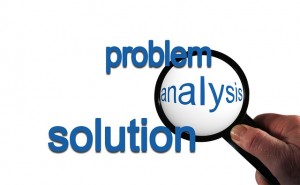 Goneaways have become more difficult to identify for debt collection agencies, complicating tracing methods utilised in order to access and interact with customers. It used to be the case that all goneaways could be identified quite easily and treated equally, but major changes in the industry and in housing have made this much more difficult. The industry is facing the challenge of ensuring that organisations avoid repeated, contact with third parties to whom the relevant accounts do not belong. Such incorrect contact has significant consumer impact and this is among the issues Wescot, along with other ethical debt collection agencies, wish to resolve.
Goneaways have become more difficult to identify for debt collection agencies, complicating tracing methods utilised in order to access and interact with customers. It used to be the case that all goneaways could be identified quite easily and treated equally, but major changes in the industry and in housing have made this much more difficult. The industry is facing the challenge of ensuring that organisations avoid repeated, contact with third parties to whom the relevant accounts do not belong. Such incorrect contact has significant consumer impact and this is among the issues Wescot, along with other ethical debt collection agencies, wish to resolve.
One problem facing the industry is the tendency of many organisations to regard trace activity as a mere exercise in data gathering and not as an investment. This attitude has led several organisations to choose cheap and quick approaches to trace and to miss out on the benefits, to the consumer and organisation, of approaching trace with more care and attention. The necessity of finding solutions that enable ethical and effective customer interaction, in particular with no-contact segments, is becoming increasingly pressing within a culture that is more and more customer-centric. It is estimated that 30-40% of no-contact segment populations are ‘hidden’ goneaways and how to approach this issue remains a major concern within the industry.
Simon Armitage, the head of product development at Wescot, has emphasised the vital importance of customer contact. It is clear that investing in the cost associated with a trace or a contact is critical in many cases, but the industry remains challenged by how organisations within it may demonstrate a good return against such investments made. The value of such investments, Armitage says, is in the results’ visibility alongside the organisation’s consequent capability, which is to consider the results in question and apply the most appropriate treatment. Mis-use of third-party data is unlikely when this approach is taken. It is also the case that correct, ethical treatment is made easier, with appropriate ways of dealing with the situation being clearer in such instances. Older tracing formats are evolving alongside the emergence of new trace products to accommodate this responsible approach. The broader market can significantly benefit, alongside organisations in the sector, from a product that delivers live customer contact and not merely data validation in its basic form.

 Also of relevance is the fact that the way organisations interact with customers has changed dramatically over the last few years. In many b2c relationships, the vast majority of contact is online. If it is a longstanding relationship which suddenly turns into a non-contact scenario, the challenge faced by a business is to consider whether the last known physical address and telephone details for that customer are correct. In this climate, many businesses are likely to benefit from effective early arrears reconnection services. Not only can this approach maximise the chances of recovery, it can also increase the chances of rehabilitating the relationship between the customer and the organisation. Businesses are likely to benefit from approaching a company with a proven track record in customer tracing. Wescot for instance, employs a highly experienced locate team coupled with an effective validation process – both of which combine to help re-establish contact between customer and client.
Also of relevance is the fact that the way organisations interact with customers has changed dramatically over the last few years. In many b2c relationships, the vast majority of contact is online. If it is a longstanding relationship which suddenly turns into a non-contact scenario, the challenge faced by a business is to consider whether the last known physical address and telephone details for that customer are correct. In this climate, many businesses are likely to benefit from effective early arrears reconnection services. Not only can this approach maximise the chances of recovery, it can also increase the chances of rehabilitating the relationship between the customer and the organisation. Businesses are likely to benefit from approaching a company with a proven track record in customer tracing. Wescot for instance, employs a highly experienced locate team coupled with an effective validation process – both of which combine to help re-establish contact between customer and client. By looking closely at the way this company operates, it is possible to see how it has managed to achieve considerable success against what may be regarded as a ‘difficult’ financial landscape. For one thing, the company aims to treat customers fairly and to engage with each customer in an effective manner. In this way, it is possible to open up a constructive dialogue and to come up with a realistic repayment plan. This is in marked contrast to the bad practices that previously earned the sector a bad name and which Wescot has always rejected. Such practices include poor tracing methods – including doing little or nothing to verify customer contact details to try and ensure they are as up to date as possible. Other examples of bad practice include aggressive letters, an excessive number of phone calls and uncontrolled doorstep visits.
By looking closely at the way this company operates, it is possible to see how it has managed to achieve considerable success against what may be regarded as a ‘difficult’ financial landscape. For one thing, the company aims to treat customers fairly and to engage with each customer in an effective manner. In this way, it is possible to open up a constructive dialogue and to come up with a realistic repayment plan. This is in marked contrast to the bad practices that previously earned the sector a bad name and which Wescot has always rejected. Such practices include poor tracing methods – including doing little or nothing to verify customer contact details to try and ensure they are as up to date as possible. Other examples of bad practice include aggressive letters, an excessive number of phone calls and uncontrolled doorstep visits. The phrase ‘Compliance’ covers many areas. It affects all parts of a business and how it operates, including not just the firm’s policies and strategy but also the way in which it communicates with each individual customer. Taking compliance seriously means having the governance arrangements in place to ensure a consistent approach throughout the entire business. Looking carefully at the regulations and guidelines that are relevant to the particular organisation’s activities is obviously important. Equally as important is ensuring that the practices conducted by the business are in accordance with the spirit of those regulations.
The phrase ‘Compliance’ covers many areas. It affects all parts of a business and how it operates, including not just the firm’s policies and strategy but also the way in which it communicates with each individual customer. Taking compliance seriously means having the governance arrangements in place to ensure a consistent approach throughout the entire business. Looking carefully at the regulations and guidelines that are relevant to the particular organisation’s activities is obviously important. Equally as important is ensuring that the practices conducted by the business are in accordance with the spirit of those regulations. A model debt collection agency is one that has compliance at the heart of everything it does. For anyone looking for a debt collection solution from a reliable company, it is worth paying particularly close attention to Wescot. This leading UK debt collection agency is not only a leading member of the Credit Services Association, it has also been active in helping to shape and improve practice standards for the consumer credit industry as a whole.
A model debt collection agency is one that has compliance at the heart of everything it does. For anyone looking for a debt collection solution from a reliable company, it is worth paying particularly close attention to Wescot. This leading UK debt collection agency is not only a leading member of the Credit Services Association, it has also been active in helping to shape and improve practice standards for the consumer credit industry as a whole. By making actual and meaningful contact with a customer once he or she has been located, it provides far greater opportunity to deal with the arrears issue in an effective manner. Re-engagement makes it possible to treat customers fairly and work out a repayment plan that is acceptable to both the individual customer and to the organisation. It also opens up the possibility of rehabilitating the relationship between business and customer. From this perspective it can be seen that there is a place for basic data validation but at the same time, this should not be seen as a cheap and easy alternative to a product focused on delivering live customer contact.
By making actual and meaningful contact with a customer once he or she has been located, it provides far greater opportunity to deal with the arrears issue in an effective manner. Re-engagement makes it possible to treat customers fairly and work out a repayment plan that is acceptable to both the individual customer and to the organisation. It also opens up the possibility of rehabilitating the relationship between business and customer. From this perspective it can be seen that there is a place for basic data validation but at the same time, this should not be seen as a cheap and easy alternative to a product focused on delivering live customer contact. An integral part of collecting debts is the trace procedure, which is why companies like Wescot are able to find the customers and begin the collection process. Given that the company will only receive payment from a client once the collection has been made, it is important that the trace procedure is as efficient as possible. Customer’s residency is a common issue with tracing as residency is far more fluid and transitional than in years gone by. With the rise in people renting as opposed to getting a mortgage, customers are able to move around a lot quicker, which makes for a large number of mis-trace results if data sources are not cleansed regularly.
An integral part of collecting debts is the trace procedure, which is why companies like Wescot are able to find the customers and begin the collection process. Given that the company will only receive payment from a client once the collection has been made, it is important that the trace procedure is as efficient as possible. Customer’s residency is a common issue with tracing as residency is far more fluid and transitional than in years gone by. With the rise in people renting as opposed to getting a mortgage, customers are able to move around a lot quicker, which makes for a large number of mis-trace results if data sources are not cleansed regularly. etition and the global economy are primary factors in how debt recovery is going to proceed in the future. Not only does the UK’s economy as a whole play a big part in the performance of a debt agency, but so too does the performance of that company’s competitors.
etition and the global economy are primary factors in how debt recovery is going to proceed in the future. Not only does the UK’s economy as a whole play a big part in the performance of a debt agency, but so too does the performance of that company’s competitors. involved in the recovery process. The financial services sector has suffered from decreasing levels of consumer confidence in recent times due to the current financial climate and the banking crisis. In order to rebuild trusting relationships with consumers, the industry has attempted to improve how debt collection agencies contact individuals, how they communicate with them and also how they recover the debt itself.
involved in the recovery process. The financial services sector has suffered from decreasing levels of consumer confidence in recent times due to the current financial climate and the banking crisis. In order to rebuild trusting relationships with consumers, the industry has attempted to improve how debt collection agencies contact individuals, how they communicate with them and also how they recover the debt itself.